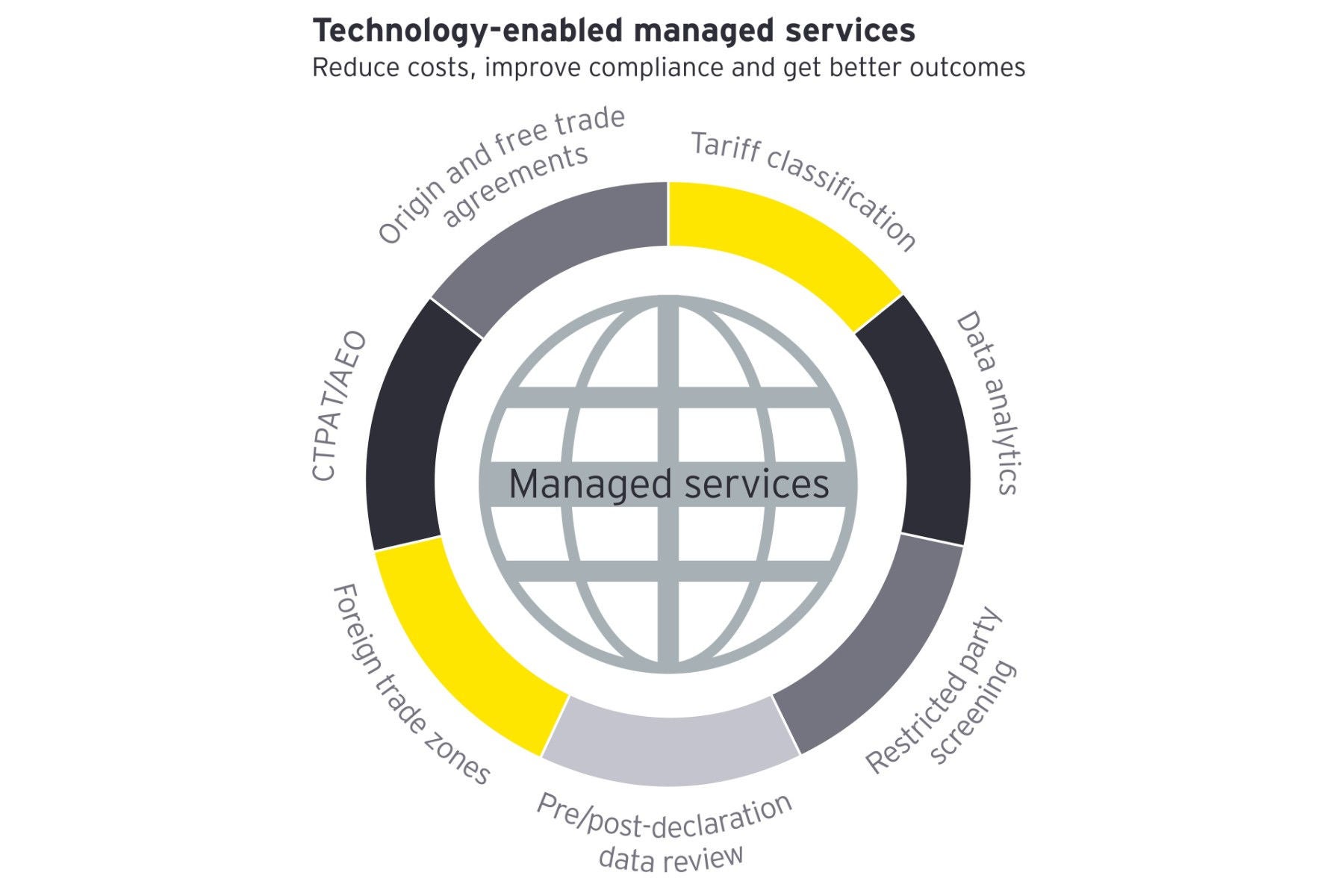EY refers to the global organization, and may refer to one or more, of the member firms of Ernst & Young Global Limited, each of which is a separate legal entity. Ernst & Young Global Limited, a UK company limited by guarantee, does not provide services to clients.
Global trade operations
Gain control of global trade
Sign up for our mailing list on current trade issues.
What EY can do for you
Amid ongoing geopolitical, economic and regulatory uncertainty, today’s world continually grows more complex, creating new challenges for doing business across borders. In such a fluid environment, continuing to rely on the trade approaches of the past will not position you well for the future.
Operating under staffing and budget constraints, trade functions face compliance risks that aren’t being sufficiently addressed and repetitive tasks (such as classification) that are often performed manually and inconsistently. Meanwhile, evolving technology has created a steady stream of opportunities to reimagine these functions, bringing together data from antiquated, disparate systems and driving greater visibility and control.
How can you spend less time on tactical/transactional activities and more on strategic and focused activities that create value? One way is to turn to EY Trade Connect — a modular technology platform that links EY clients to a broad spectrum of managed services that can adapt and evolve with the changing needs of the business. Our managed services include tarrif classification, data analytics, restricted party screening, pre/post-declaration data review, foreign trade zones, CTPAT/AEO and origin and free trade agreements.

About EY Trade Connect
With EY Trade Connect, you gain a flexible toolkit of innovative technology united with our technical knowledge and global reach, helping you link big-picture strategic thinking with the on-the-ground operations of global trade.
Through real-time trade intelligence, advanced analytics and automated services, this powerful platform helps businesses view their trade operation with clarity and act with precision, helping to manage costs, reduce disruption and mitigate risks associated with global trade.
Key benefits
- Automation of key tasks, such as classifying products for export, assisting with pre- or post-entry compliance, and filing or exploring options for duty deferral
- Extensive trade intelligence updated in real time — from tariff and classification codes to restricted parties and global compliance rules — that drives confident decision-making
- A platform with Automated Broker Interface (ABI) software approved by and directly interfacing with US Customs and Border Protection
- Fully scalable services, allowing you to outsource some or all of your trade operations in a way that is most advantageous and cost effective to your business
- Connection to our global team of more than 1,100 trade professionals with deep technical knowledge and a familiarity with trade protocols across the globe
A well-developed trade strategy can uncover hidden costs and drive significant value — including improved compliance, 10% to 20% decrease in duties and cross-border fees, and a 20% to 30% reduction in cost.
The time to act is now. Whether you need technical customs advice, technology and trade automation support or assistance managing export issues or controversy, the EY Global Trade team can work with you reduce costs, improve compliance, manage risks and achieve the strategic objectives of your business. Take control of your global trade operations today so you can enhance performance tomorrow.![]()
How EY can help
-
EY Global Trade Managed Services can help businesses manage costs, speed supply chains and reduce risks of their trade operations. Find out more.
Read more
The team
Our latest thinking
How disruption is shaping opportunities for global trade
In the face of continued geopolitical uncertainty, indirect tax and trade functions have an opportunity to show their real value. Find out more.
How sustainability is shaping global indirect tax
Indirect tax leaders need to not only comply but spot the opportunities in the ever-evolving group of sustainability taxes and incentives. Find out more.
Why the gender gap in international trade needs to close faster
Some gender gaps are closing, but the pace of progress is too slow in trade. Reformers in government and business can show the way. Learn more.








